国際ビジネスにおいて活躍するグローバルマネジャーを育成する専門職大学院として2005年に開設され、国際ビジネスの共通言語である英語を公用語としています。約半数が外国人教員という国際性豊かな教育環境で、世界23ヵ国から来日したビジネスパーソンが学ぶ国際ビジネススクールです。教育の特色として、ビジネススクールの基盤領域である(1)組織経営、(2)事業戦略に、国際ビジネスに必須な(3)国際対応、日本的経営の強みである(4)応用情報を加えた4領域の学際的なアプローチにより、国際力・情報力に優れた実践的マネジメント能力の育成を目指しています。
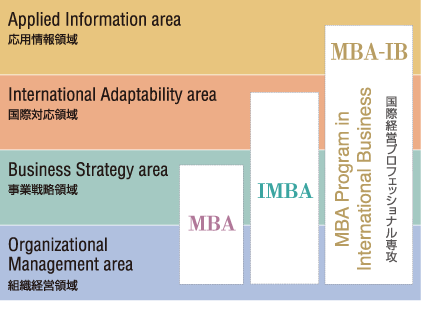
国際経営プロフェショナル専攻では以下の5つの教育領域を設置しています。
1. 応用情報領域
2. 国際対応領域
3. 事業戦略領域
4. 組織経営領域
5. 共通領域
国際経営プロフェッショナル専攻は、2005年4月に専門職大学院課程として設置されました。本専攻では、国際的な経営環境の潮流を的確に分析しながら、国内と海外の戦略的一貫性に基づく統合的なマネジメント技能をもつ国際経営プロフェッショナルの育成を目指し、幅広い領域における講義と学生個々の業種に対応した「ビジネスプロジェクト」を導入しています。
本専攻の教育目標を実現し、国際競争力のある専門職大学院にふさわしい教育プログラムを提供するため、言語、講義、実習に関して4つの特色ある教育方法を実施します。
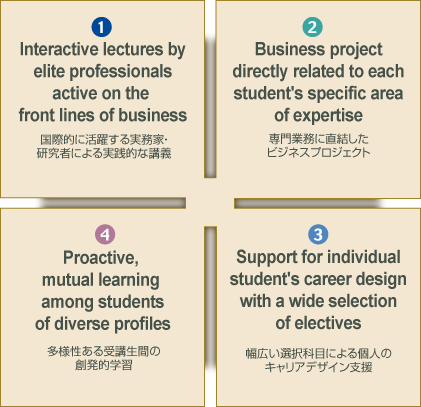
国際経営プロフェッショナル専攻では、標準150分の授業を平日夜間は1コマ(18:20-21:00)、土曜日は4コマ(8:55-21:00)開講しています。また、標準的な授業は、150分×5回(5週)で完結し、1単位を修得できます。2年間の標準的な履修方法としては、講義科目32単位、セミナー科目5単位、ビジネスプロジェクト8単位(最終学期)を履修し、修了に必要な45単位以上を修得します。
| Core | 8 |
|---|---|
| Elective | 24 |
| Seminar | 5 |
| Business Project | 8 |
| Total | 45 |
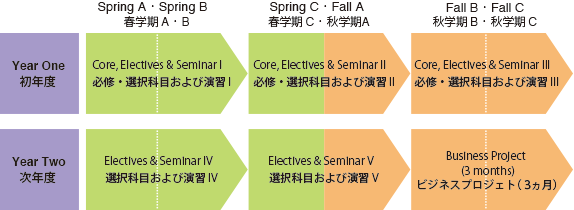
高いポテンシャルを持つ専門家を育成するというMBA-IBプログラムが掲げるミッションを踏まえると、ビジネスプロジェクトはプログラムの最頂点にあたります。ビジネスプロジェクトは、学生にとって最後の学期に行われ、レクチャーやセミナーを通して得た知識を統合することを意図しています。
ビジネスプロジェクトの目的は、実践的なビジネスコンピテンシー(例えば、実際のビジネスの場における問題解決や組織運営)を学ぶことです。学生は、以下の中から一つを選択できます。
1. In-Company Project (ICP)
2. Business Plan Development (BPD)
3. Independent Research Report (IRR)
4. Overseas Internship (OI)
5. Japan Internship (JI)
 MBA-IBは、高度専門職業人の育成を目指す専門職大学院であり、学校教育法第109条第3項及び学校教育法施行令第40条の規定により5年ごとに、外部認証評価機関により、教育課程、教員組織その他教育研究活動の状況について評価を受けることが義務付けられています。そのため、ABEST21 International (THE ALLIANCE ON BUSINESS EDUCATION AND SCHOLARSHIP FOR TOMORROW、a 21st century organization)による認証評価を申請し、受審しています。本認証プロセスは、第一段階「評価申請の受理審査」、第二段階「18基本視点に基づく自己点検評価」、第三段階「81細項目視点による自己点検評価」、第四段階「5名の外部委員による現地調査」から構成され、約1年半にわたる審査期間を要し、最終的に提出した自己点検報告書は132頁に及びます。
MBA-IBは、高度専門職業人の育成を目指す専門職大学院であり、学校教育法第109条第3項及び学校教育法施行令第40条の規定により5年ごとに、外部認証評価機関により、教育課程、教員組織その他教育研究活動の状況について評価を受けることが義務付けられています。そのため、ABEST21 International (THE ALLIANCE ON BUSINESS EDUCATION AND SCHOLARSHIP FOR TOMORROW、a 21st century organization)による認証評価を申請し、受審しています。本認証プロセスは、第一段階「評価申請の受理審査」、第二段階「18基本視点に基づく自己点検評価」、第三段階「81細項目視点による自己点検評価」、第四段階「5名の外部委員による現地調査」から構成され、約1年半にわたる審査期間を要し、最終的に提出した自己点検報告書は132頁に及びます。
認証評価審査の結果、MBA-IBはABEST21が定める認証評価基準に適合し、「教育研究の方策は、評価基準が大体において満たされ、教育研究の質維持向上の保証が期待でき、優れている」と認定されています。とくに、MBA-IBの「グローバル・ハイブリット型実践学習(Global Hybrid-Action Learning)」は特筆すべき優れた教育プログラムとして評価できる」との講評を得ています。 「グローバル・ハイブリット型実践学習」とは、日本的経営の強みである「組織力」と「技術力」をベースとして、世界各国の「経営システム」、「異文化対応」を融合した実践的学習を指します。
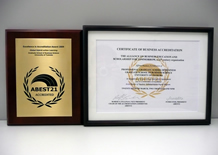
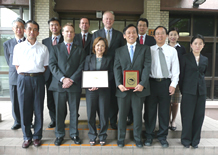
Tsukuba Short-term Study Program (TSSP) のもと、本専攻は海外の一流大学7校と交換留学制度を設けています。他国のビジネス文化を体験したい学生にはとても素晴らしい機会です。留学に際し、学籍の異動はありませんので、受け入れ先大学での授業料と登録費の支払いは免除となります。